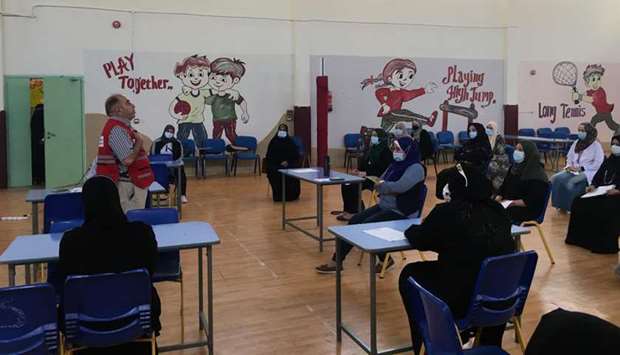Qatar Red Crescent Society (QRCS) has initiated a new edition of its QRCS School Programme for the academic year 2020-2021.
Implemented in co-ordination with the Ministry of Education and Higher Education, the annual programme seeks to create an enriched learning environment and promote a culture of safety and security within the school community.
Prior to the back-to-school season, QRCS held training courses in August on Covid-19 Preventive and Safety Behaviours in the New School Lifestyle”. The courses were attended by 401 teachers and administrative staff from 10 private schools.
Under the social distancing policy, the program will apply a remote communication mechanism. Educative videos will be produced for the students and school community, tackling a wide range of key topics.
Among these topics are: precautionary measures to deal with the Coronavirus pandemic, introducing the Coronavirus (symptoms, transmission, and prone groups), how to protect oneself and others, washing hands (when, how, and why), respiratory health (coughing and sneezing etiquette, nose and mouth cleansing, and staying indoors), safe masks (what a mask is, types, when and how to use, and disposal), physical distancing at school (importance, rules, and benefits), and dealing with symptoms in case of Coronavirus infection (difficulty breathing, fever, cough, and seeking help by calling 16000).
The videos will also present the normal health topics, such as helping a fainting injured person and first aid for various school injuries.
During the academic year 2019-2020, the QRCS School Program made remarkable results, training 9,000 students, 2,000 teachers and administrative staff, and 180 head teachers.
Two tracks were followed: (1) first aid, where the trainees learnt about characteristics of a medical helper, helping a fainting injured person, first aid for sports injuries, cardiopulmonary resuscitation (CPR), artificial ventilation, and home safety; and (2) health education, which discussed healthy food, communicable diseases, nosebleed, asthma, personal hygiene, sunstroke or heat exhaustion, prevention and treatment of diabetes, diabetic coma, and safe campus.
To ensure effective inclusion, lectures were given at five centers for special needs, with a total of 350 visitors, caregivers, attendants, supervisors, and parents. The sessions talked about first aid for persons with special needs and first aid applications for the deaf.

